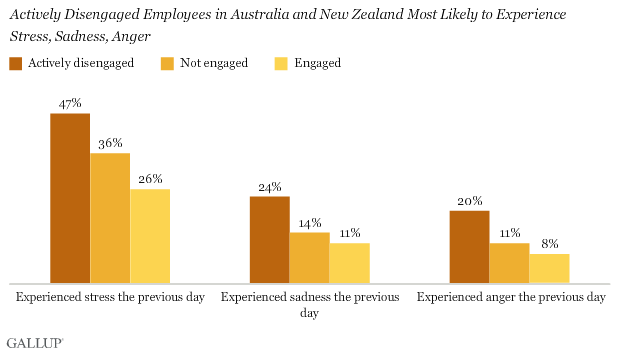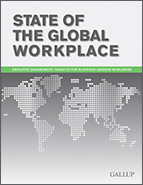Almost half of actively disengaged workers admitted to having experienced stress for much of the previous day.
The good news: Australia is a global leader in the ratio of engaged employees to actively disengaged employees in its workplaces. For every actively disengaged worker in Australian companies, 1.5 are engaged.
The bad news: Engagement results among Australian employees fall far short of engagement levels in the best companies in Gallup's global database, which have ratios of up to nine engaged employees for every actively disengaged employee. Moreover, the 16% of Australian employees who are actively disengaged cost the country around $54.8 billion (AU) -- or $51.3 billion (U.S.) -- per year.
Part of that cost is attributable to the differences in emotional health between workers who are engaged in their jobs and their less-engaged colleagues. The Australian Workplace Barometer, a 2012 report sponsored by Safe Work Australia, concludes, "Work-related stress represents a huge cost for worker health and productivity and is broadly regarded as an important social determinant of global health."
Gallup's 2011-2012 employee engagement research found that there is a relationship between low workplace engagement and the prevalence of negative emotions among employees worldwide, but it is particularly strong in Australia and New Zealand. Almost half of actively disengaged workers in the two countries (47%) admitted to having experienced stress for much of the previous day, while 24% experienced sadness, and 20% experienced anger. Each of these figures is close to double the percentage among engaged employees.

These results suggest that if leaders fostered a culture of empowerment, open communication, and care in their companies, they could mitigate the risk of psychological injury claims, which are becoming more prevalent. Creating a culture of empowerment requires strong, authentic leaders who can build their workforce's engagement levels. These leaders know their own strengths and how to support and empower their employees so Australian workers arrive at work each day with a motivated mindset. More specifically, Australia's current and future leaders must:
- Align leadership direction: Leadership teams responsible for business success need to minimize infighting and political game playing. All leaders must ensure they understand their strengths and how their roles relate to those of other leadership team members. A Top 100 ASX-listed company that introduced a strengths-based development approach to its C suite team reports feeling significantly more cohesive. One team member in particular whose contribution might otherwise have been downplayed was shown to have strong relationship-building talents -- a talent that was lacking in this particular team.
- Create alignment between employees' roles and the organization's mission: In the Australian companies Gallup studied, we found that initially, only 22% of workers strongly agreed that the mission and purpose of their company makes them feel their job is important. Line managers can improve this metric by asking employees to articulate what they get paid to do, what success looks like in their role, and whether they have what they need to achieve success. These questions can start a conversation that clarifies job expectations and how individual employees feel their contributions connect to the wider company mission and goals.